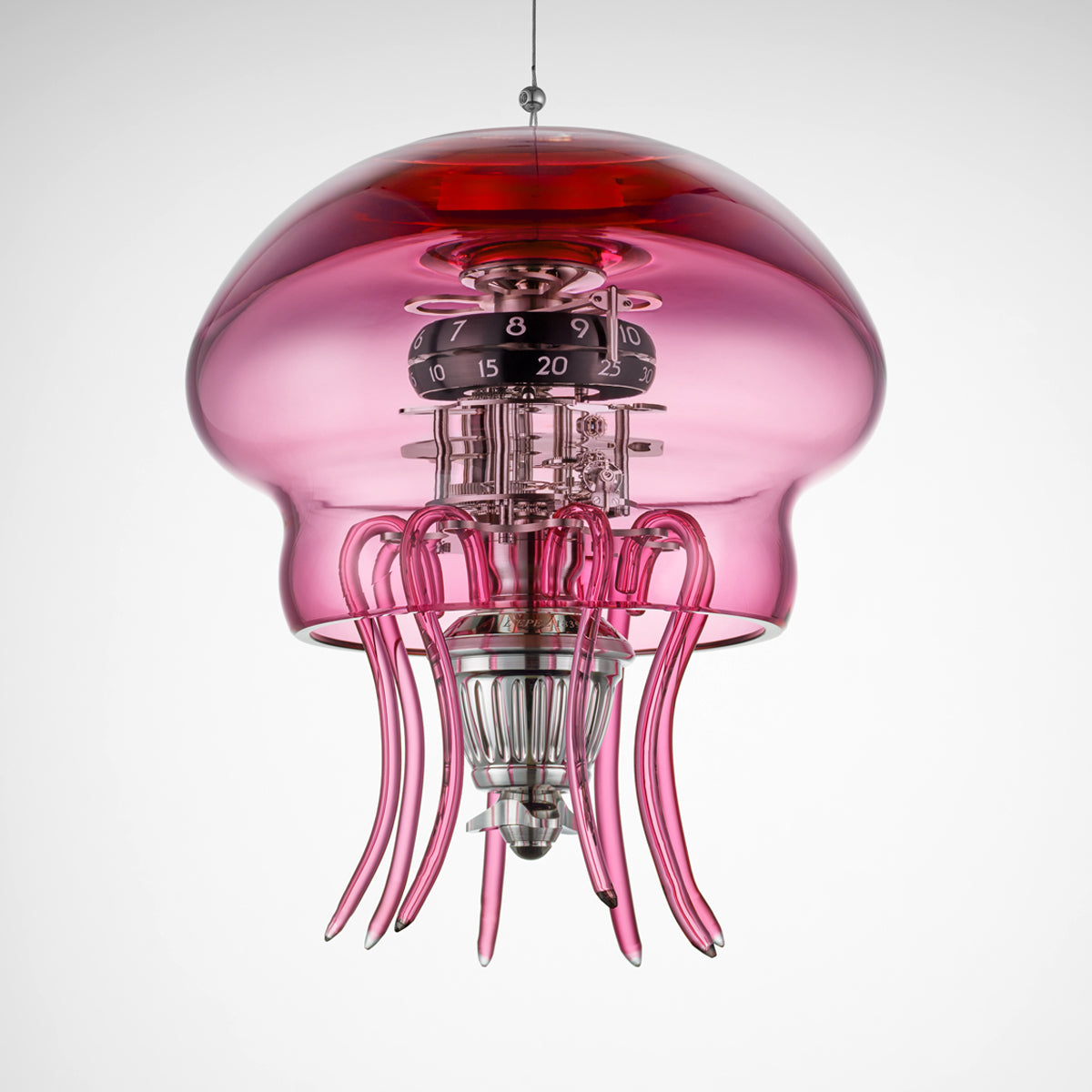

The central mass of Medusa is formed by a large transparent dome of hand-blown Murano glass that evokes the bell-shaped body of a mature jellyfish. Two rotating rings, one displaying the hours and the other displaying the minutes, are visible through the dome, and the time is read off a single fixed indicator that extends over the rings. Like a jellyfish glowing in the abyss, Medusa glows in the dark thanks to Super-LumiNova.
A movement beats underneath the time indication, forming the pulsating heart of this mechanical creature. L’Épée went back to the drawing board for Medusa, designing the movement entirely from scratch. Due to the weight of the outer glass shell and its vulnerability to shock damage, it was necessary to build a movement that could be wound one-handed, with the other hand available to stabilise the clock. Additionally, with most of the movement surrounded by glass, access to any winding or setting mechanisms would be limited.
One of the greatest challenges in bringing Medusa to life was finding a glassblower that could fully realise the design. Like most MB&F + L’Épée creations, Medusa was not designed with the current limits of technique in mind. Instead, technique was developed to accommodate its design. The central mass of Medusa is formed by a large transparent dome of hand-blown Murano glass. The glass dome appears light and delicate but has to withstand the weight of a clock movement.
Maintaining optical consistency between the glass dome and tentacles was essential, so the conventional solution of drawing the tentacles out from pre-formed glass rods was not possible. Instead, the tentacles were produced from the same glass bulk as the dome and individually hand drawn to identical shapes and widths, which requires considerable experience and skill. Out of the 40 companies that L’Épée 1839 approached, only one Murano glassblower was able to accomplish the task.

Dedicated to making high-end clocks, L'Epée has been a prominent Swiss Manufacture for over 180 years. Founded in 1839 by Auguste L’Epée in France’s Besançon region, the company originally focused on producing music boxes and watch components. The brand was synonymous at the time with entirely hand-made pieces .
From 1850 onwards, the Manufacture became a leading light in the production of ‘platform’ escapements, creating regulators especially for alarm and table clocks, as well as musical watches. It became a well-known specialist owning a large number of patents on exceptional escapements and the chief supplier of escapements to several celebrated watchmakers of the day. L'Epée has won a number of gold awards at international exhibitions.
L'Epée 1839 is now based in Delémont in the Swiss Jura Mountains. Under the impetus of its CEO Arnaud Nicolas, it has developed an exceptional table clock collection, encompassing a full range of sophisticated clocks. All models are designed and manufactured in-house. Their technical prowess, combination of form and function, very long power reserves and remarkable finishes have become signature features of the brand.
Dedicated to making high-end clocks, L'Epée has been a prominent Swiss Manufacture for over 180 years. Founded in 1839 by Auguste L’Epée in France’s Besançon region, the company originally focused on producing music boxes and watch components. The brand was synonymous at the time with entirely hand-made pieces .
From 1850 onwards, the Manufacture became a leading light in the production of ‘platform’ escapements, creating regulators especially for alarm and table clocks, as well as musical watches. It became a well-known specialist owning a large number of patents on exceptional escapements and the chief supplier of escapements to several celebrated watchmakers of the day. L'Epée has won a number of gold awards at international exhibitions.
L'Epée 1839 is now based in Delémont in the Swiss Jura Mountains. Under the impetus of its CEO Arnaud Nicolas, it has developed an exceptional table clock collection, encompassing a full range of sophisticated clocks. All models are designed and manufactured in-house. Their technical prowess, combination of form and function, very long power reserves and remarkable finishes have become signature features of the brand.
Hours and minutes
Dome/tentacles: Murano hand-blown glass
Movement and standing base: stainless steel and brass Indexes with Super-LumiNova
L’Épée suspended movement, designed and manufactured in-house
Power reserve: 7 days
Balance frequency: 2.5Hz / 18,000bph
155 components / 23 jewels
Incabloc shock protection system
Hanging position: 286 mm (tall) x Ø 250 mm
Standing position: 323 mm (tall) x Ø 250 mm
Weight: approximately 6 kg (the exact weight of the hand-blown glass dome varies)
Integrated winding key to both set the time and wind the movement (propeller at the bottom of the movement)
Medusa can be set on any flat surface thanks to a special steel frame with curved legs. When hung from the ceiling, Medusa can be further decorated with its hand-blown Murano glass tentacles, which hook onto the movement
Enter your contact details below...